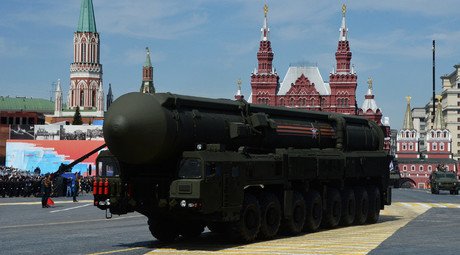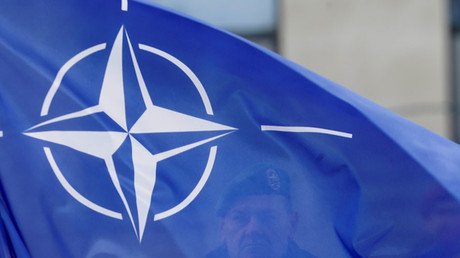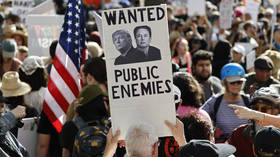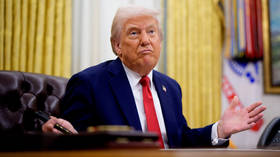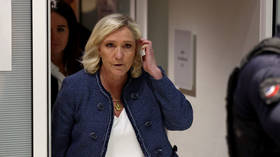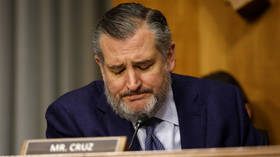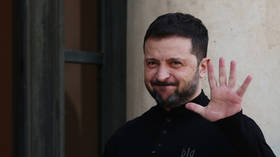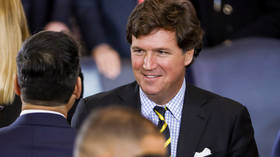Russia threatened to use nukes? US commission produces wildest claims in push for military buildup
The Helsinki Commission has gotten creative on the notorious “Russian threat,” pinning the blame for the death of an OSCE observer in Ukraine on Moscow and claiming it threatened to use “tactical nuclear weapons” – all while calling for more arms and troops on the Russian border.
Members of the US government commission, officially known as the Commission on Security and Cooperation in Europe (CSCE), on Wednesday sat down in Washington, DC for a hearing aptly named “The Growing Russian Military Threat in Europe: Assessing and Addressing the Challenge.”
The hearing focused around claims that Moscow “flagrantly violated commitments enshrined in the Helsinki Final Act relating to refraining from the threat or use of force against other states; refraining from violating other states’ sovereignty, territorial integrity, or political independence; and respecting the right of every state to choose its own security alliances.”
While statements on the “Russian aggression” are often uttered by US politicians, the veracity of some of the claims put forward at the hearing would not disappoint even the staunchest anti-Russian hawks.
Death of OSCE monitor
Alleging that Moscow “deliberately undermined its OSCE commitments” and security in Europe in general, some claimed Russia bears full responsibility for the death of an American OSCE monitor, Joseph Stone, who was killed on April 23 after the vehicle he was in struck a landmine in eastern Ukraine.
“If it was not for Russia’s aggression and a plethora of challenges that they face from the very beginning of that deployment, there would have been no death of that wonderful young man and so many others,” said Rep. Chris Smith (R-New Jersey), co-chairman of the commission.
The investigative team has not yet come forward with any conclusions concerning Stone’s death, but the death of the Special Monitoring Mission (SMM) member has already been used to fuel anti-Russia rhetoric in western media. The breakaway Lugansk People’s Republic said that the vehicle “deviated from the main route and moved along side roads, which is prohibited by the mandate of the OSCE SMM.”
'Tactical nukes threat’
However, speaking of how Russia has grown into a formidable force, threatening the entire OSCE region and “recklessly endangering the lives of millions,” Smith then added an even more bizarre claim: that Moscow “threatens to use tactical nuclear weapons against other countries.”
The New Jersey representative fell short of specifying what countries exactly are facing such threats and who has ever voiced them.
Several testimonies at the hearing specifically focused on Russia’s alleged sabotaging of the Open Skies Treaty, related to military transparency and non-proliferation agreements, by allegedly introducing “nuisance restrictions” that make it inconvenient for NATO jets to monitor such places as Moscow or Russia’s exclave of Kaliningrad.
US military can’t shake Cold War mindset – Russian MOD https://t.co/uG6ksq3ickpic.twitter.com/8w4h52UI2f
— RT World News (@RT_World_News) May 6, 2017
Stephen Rademaker, from the Podesta Group, admitted that Russian continues to implement the treaty but claimed that it “does so in a way to minimize the benefits of the treaty to other parties,” including the US.
The Open Skies Treaty was struck in 1992 and came into force in 2002 with 34 signatories, including Russia, US and most of its NATO allies. Moscow continues to heed its obligations under the treaty, with a joint US-Czech Republic mission conducting an intelligence flight over Russian territory as recently as April 21.
The latest series of flights over US territory are scheduled to be carried out by Russian Tu-154M LK-1 aircraft between May 15 and May 20, according to the head of Russia’s National Nuclear Risk Reduction Center, Sergei Ryzhkov.
‘Create new missile, send arms to Ukraine’
Meanwhile, in the view of Michael Carpenter, Former Deputy Assistant Secretary of Defense and senior director at Biden Center for Diplomacy and Global Engagement, Russia also violated its commitments under the Intermediate-Range Nuclear Forces Treaty.
READ MORE: Russia increases nuclear sub fleet, combat patrols reach Soviet-era levels
Carpenter has called for the US to “immediately begin research…into the development of an intermediate-range missile that would match Russian new capability” following his claim.
With that, he argued, that US should relieve itself of the obligations it undertook under the NATO-Russia founding act and aim to dispatch “an additional US brigade combat team to Eastern Europe as a deterrent force.”
Carpenter said the US should start more actively arming Ukraine by scrapping what he described as a “de-facto arms embargo,” supplying Kiev with air defense and anti-tank systems.
Stephen Pifer, director of the Arms Control and Non-Proliferation Initiative and a senior fellow with the Center for 21st Century Security and Intelligence at the Brookings Institution, went even further, suggesting that such arms supplies to Ukraine should involve not only defensive weaponry but also “certain types of lethal assistance,” including MANPADS and anti-armor weapons.
READ MORE: Russia 'full-scope cyber actor' that will remain 'major threat' to US ‒ intel director
‘No interest in European security’
New security agreements between Washington and Moscow should not be a part of the agenda in the foreseeable future, Carpenter said.
“Russia is no longer interested in cooperation to strengthen European security. Just the opposite,” he said.
Contrary to the claim, Moscow has repeatedly voiced its readiness to boost security cooperation in Europe and its dialogue with NATO.
READ MORE: ‘Focus of any discussion in Washington is on demonizing Russia’
In March, Russia’s Defense Ministry invited representatives of all NATO member countries along with its leadership and the EU to take part in the Moscow Conference on International Security.
“If someone holds a different point of view, let him outline it and we’ll take it into account in our further work. In a word, we count on open and interested discussions,” Aleksandr Fomin, Deputy Defense Minister, said at the time.
‘Kremlin policy must change’
However, talking on equal terms may not be the favored option in Washington, with Pifer arguing that Moscow must take unilateral steps to ease the crisis in Ukraine.
“What is needed to bring peace, however, is a change in the Kremlin’s policy,” Pifer said, adding that “the US and the West should support Kiev politically.”
The apparent suggestion that Russia must change its foreign policy course ironically comes as Washington is accusing Russia of interfering into the November 2016 presidential elections, with media campaign and investigations into the alleged interference currently in full swing.
Speaking alongside German Chancellor Angela Merkel in Sochi, Russian President Vladimir Putin stated that Russia “never interferes, either in political life or in the political processes of other countries,” and would like to see other countries following suit.
#Putin: We never interfere in other countries’ politics as others do
— RT (@RT_com) May 2, 2017
WATCH LIVE: https://t.co/0cI5Cg42EYpic.twitter.com/0c202uv8nL
“Unfortunately, what we see is precisely the opposite. We have seen attempts to interfere in internal political processes in Russia for a very long time,” Putin said.
READ MORE: Putin ready to provide records of Trump-Lavrov talks to prove no secrets were leaked
